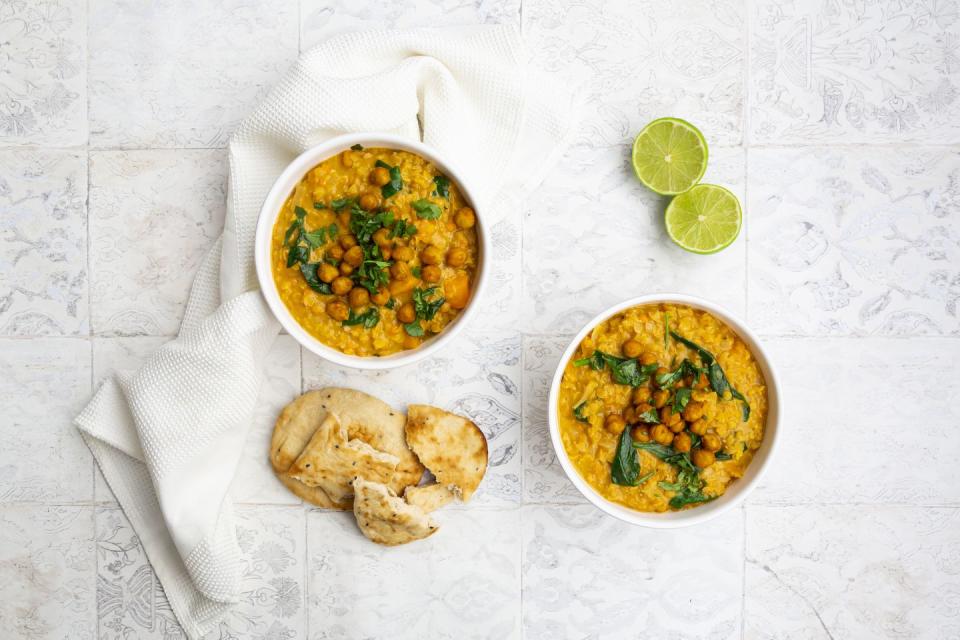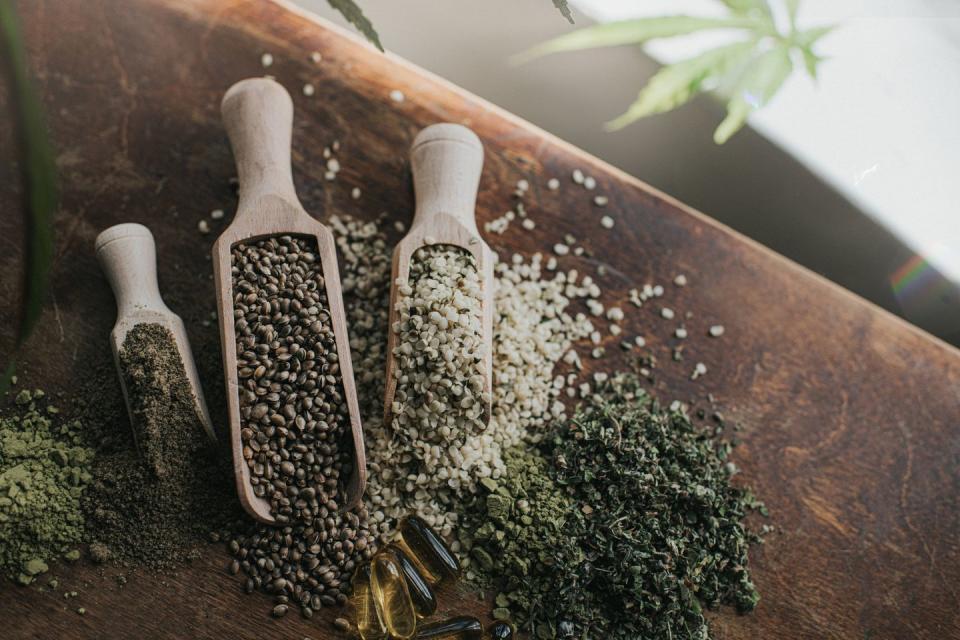18 of the best high-protein sources for vegans and vegetarians

If you're thinking about going plant-based or have already taken the plunge, either way you might benefit from adding some high-protein vegan foods to your diet. There's a pervasive rumour that vegetarian and vegan diets lack sufficient protein, and while that can certainly be true, it doesn't take much effort to top up your stocks.
It makes sense to be concerned: protein is essential for promoting muscle growth and repair. Certain foods contain significantly higher protein levels than others, so it pays to plan your shopping list. But if you've cut animal products from your diet, there are a few easy-wins you can add to the menu to top-up your protein stores.
Kajsa Ernestam, in-house nutritionist at health app Lifesum, and Lisa Simon, registered dietitian at Plant Based Health Online, recommend 18 high-protein vegan foods to tick off your daily quota – so you can focus on saving the world:
1. Quinoa
Most grains contain a small amount of protein – but quinoa is unique in that it contains more than 8g per 180g serving, says Ernestam, with two portions containing a chicken fillet's worth of protein. Naturally gluten-free, quinoa is amazingly versatile and can be added to everything from a soup to a salad, or as an alternative to oatmeal in the morning.
2. Seitan
Seitan is made by combining wheat gluten, water, spices and herbs. It's an excellent source of protein, with one 80g serve containing approximately 17g of protein, says Simon. 'It's also a source of iron and calcium,' she says. 'Some brands contain high levels of salt, with one serve potentially containing more than 3g – half the recommended daily intake (RDI).'
3. Teff
Like quinoa, teff is a high-protein 'ancient grain', and contains around 11g per cooked 240g serving. Along with being gluten-free – teff originates from grass and is therefore suitable for those with coeliac disease, gluten sensitivity and wheat allergy – it's high in plant-based iron and super tasty, says Ernestam. Plus, it's loaded with B vitamins and fibre.
4. Lentils
Packing around 18g of protein per 240g serve, lentils are one of the best high-protein vegan foods. 'They are packed with fibre, B vitamins, phytochemicals, and minerals such as iron, magnesium and zinc,' says Simon. Interestingly, their protein content depends on the type consumed, she adds, 'for example, green lentils are higher in protein than red lentils.'

5. Chickpeas
Low in fat and high in protein, chickpeas are a worthy addition to any diet. These versatile beans can be added into salads, made into hummus, or tossed with spices and roasted, says Ernestam. The amount of protein in 30g chickpeas is equal to an egg – around 6g. Sprinkle them over your lunch and you'll be on your way to reaching your protein RDI.
6. Beans
Beans contain lysine, an essential amino acid that helps your body to convert fatty acids into energy, says Ernestam. Lysine also helps to lower your cholesterol levels and speeds up the body's absorption of calcium – leading to strong and healthy bones. White beans are especially rich in protein, iron, and fibre as well as being a great source of calcium.
8. Tofu, tempeh and edamame
Tofu, tempeh and edamame are all soy-based products: edamame are immature soybeans, tofu is made from pressed bean curds, and tempeh is made from cooked, fermented soybeans. All three are complete proteins – meaning, they contain all nine essential amino acids – but their content varies depending on how the soy has been prepared. For example, firm uncooked tofu is richer in protein than softer tofu, says Ernestam.
9. Soy milk
Not only does each 240ml glass of soy milk provide around 7g of protein, but supermarket brands usually fortify their product with calcium, vitamin D and vitamin B12 before bottling. Add unsweetened soy milk to your morning coffee, or have a warming glass before bed for a good night's sleep, suggests Ernestam.
10. Kamut
Kamut is a nutrient-dense variety of ancient cereal that forms part of the wheat family. It has 30 per cent more protein than everyday wheat, says Ernestam, and it's a bumper source of fibre. One 172g serving contains 100 per cent of your selenium RDI, 29 per cent of your zinc requirements, and 25 per cent of your niacin intake.
11. Nutritional yeast
A complete source of plant protein, nutritional yeast contains around 2.5g of protein per 5g teaspoon. It also contains a range of B vitamins – including B12 – plus iron and zinc, says Simon. 'Nutritional yeast can be added to a cashew based sauce to give a cheesy, nutty taste, used in place of cheese on pizzas, pasta dishes and baked beans, and can also be added to a sandwich or sprinkled over avocado on toast,' she says.

12. Hemp seeds
Around 20 per cent of the calories in hemp seeds come from protein, says Simon, with almost 10g of protein per 30g. However, hemp seeds aren't just healthful for their protein content. 'They are also a source of ALA, which is a dietary precursor to omega 3,' she says. 'Hempseed oil has a good ratio of omega 3 to omega 6 fatty acids, which is important for balancing the anti-inflammatory versus the more inflammatory effects on the body.'
13. Pumpkin seeds
One 28g serving of pumpkin seeds contains roughly 7g of protein, plus more than one third of your daily phosphorus, manganese and magnesium intake. They're also loaded with antioxidants and heart-healthy polyunsaturated fatty acids. Roast them for 15 minutes and add to your lunch salad, or sprinkle them onto morning oats, suggests Ernestam.
14. Green peas
Don't underestimate the power of green peas. These tiny orbs contain 4g of protein per 80g serving, making them one of the most protein-rich veggies around. 'They're also high in fibre and a good source of vitamin C – important to aid iron absorption in plant-based meals,' says Simon. 'Frozen green peas are comparable to fresh peas in terms of nutrition.'
15. Nut Butters
Nut butters – such as peanut or almond – contain as much as 8g of protein per 30g serve, depending on the nut and seed variety. They're also choc-full of healthy fats and fibre, plus nutrients like vitamin E and potassium, making them a healthy treat or tasty addition to a creamy sauce. Just make sure you chose a vegan brand with as few additional ingredients as possible, says Ernestam.
16. Oats
Believe it or not, oats contain more than 4g of protein per 40g serving. 'There are many other benefits to eating oats, including their high fibre content and ability to lower 'bad' LDL cholesterol,' says Simon. 'They are also a source of folate and minerals such as calcium, iron, zinc and potassium.' Avoid instant oats – especially those with added sugar – and choose rolled, jumbo, or steel-cut oats to reap the most benefits.
17. Buckwheat
Being a seed, buckwheat is naturally high in protein, containing around 5g per 100g. Its amino acid profile is well-balanced, which means it's a high-quality plant-based protein. Buckwheat is also gluten-free, so a good option for people who are gluten-intolerant. Buckwheat pancakes are a high-protein alternative for plain flour pancakes, says Ernestam.
18. Spirulina
Thanks to its potent antioxidant content, you're most likely to find spirulina blended into a health smoothie or packed into daily capsules, but this nutritionally-dense blue-green algae is also loaded with protein – 66g in every 100g. 'It also contains large amounts of calcium, magnesium and B12, and small amounts of iron,' says Simon.
Last updated: 26-02-2021
You Might Also Like


